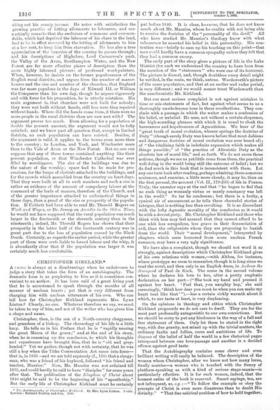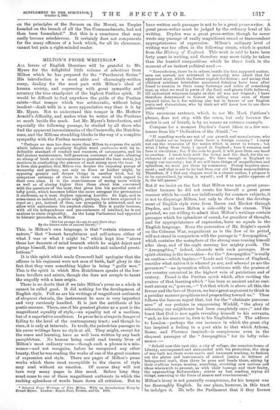CHRISTOPHER KIRKLAND.*
A CRITIC is always at a disadvantage when he endeavours to judge a story that takes the form of an autobiography. The dramatic form is as perplexing to him as it is sometimes con- venient to an author. It has been said of a great living poet that he is accustomed to speak through the mouths of all manner of unclean beasts ; yet that is very different from charging him with unclean utterances of his own. Who can tell how far Christopher Kirkland represents Mrs. Lynn Linton? Clearly, no one. Whatever therefore we say, we must be taken to say of him, and not of the writer who has given him a shape and name.
Christopher, then, is the son of a North-country clergyman, and grandson of a bishop. The chronology of his life is a little hazy. He tells us in his Preface that he is "rapidly nearing the great Mecca of the grave ;" and at the end of his story, when he is summing up the conclusion, to which his thoughts and experiences have brought him, that he is "old and grey- headed." Yet we gather, though not with certainty, that he was still a boy when the Tithe Commutation Act came into force— that is, in 1836—and we are told expressly (I., 118) that a clergy- man, who was a friend of his boyhood, followed "his friend and teacher, Maurice." Now, Mr. Maurice was not ordained till 1835, and could hardly be said to have " disciples " for some years after that. The publication of the Kingdoin of Christ about 1840 might be said to be the beginning of his "apostleship." But the early life of Christopher Kirkland must be certainly
• The Autobiography of Chriptopher Kirkland. By Mrs. Lynn Linton. 3 vole. London Richard Bentley and Son. 1E85.
put before 1840. It is clear, however, that he does not know much abut Mr. Maurice, whom. be credits with not being able to receive the doctrine of the "personality of the devil." All who have studied Mr. Maurice's theology know with what vehemence he asserted his belief in this personality. His con- tention was—briefly to sum up his teaching on this point—that men could hardly have a common sympathy unless they felt that they had a common enemy.
The early part of the story gives a picture of life in the Lake District (for such we understand the country to have been from the mention of the " statesmen " who were one of its features). The picture is dismal, and, though doubtless every detail might be verified, in the main, we think, untrue. Wordsworth's picture of the same population, and that at an earlier and ruder period, is very different ; and we would sooner trust Wordsworth than the anachronistic Mr. Kirkland.
But our most serious complaint is not against mistakes in time or mis-statements of fact, but against what seems to us a thoroughly unwholesome tone in these recollections. They con- clude with a passage in which the writer makes a confession of his belief, or unbelief. He uses, not without a certain eloquence, the high-sounding phrases with which it is usual to cloak the barrenness and hopelessness of Agnosticism. We hear of the "great truth of moral evolution, whence springs the doctrine of Duty" (though surely Duty was known before that most dubious and dangerous doctrine of moral evolution was ever heard of); of "the vitalising faith in indefinite expansion which makes all things possible;" of "the practice of Altruistic Duty as the absolute law of moral life," and so forth. We do not scorn these notions, though we see as yet little come from them, the practical well-doing in the world being still the outcome of belief; but we do find much in this book that is inconsistent with them. Let any one turn back after reading, perhaps admiring, these sonorous sentences, and examine, a little more closely, it may be, than on the first perusal, the account (Vol. IL, 179-203) of life in France. Truly, the narrator says at the end that "he began to feel that no such thing as womanly virtue or manly constancy was left in the world." So far he condemns; but there is a levity, a cynical air of amusement as he tells these shameful stories of intrigue, that is nothing less than revolting. It is as discordant with the lofty Agnostic morality of the conclusion as it would be with a devout piety. Mr. Christopher Kirkland and those who think with him may feel assured that they cannot afford to be one whit less scrupulous, less grave in their denunciation of evil, than the religionists whom they are proposing to banish from the world. Their "moral development," interpreted by chapters which seem borrowed from some unclean French romance, may have a very ugly significance.
We have also a complaint, though we should not word it so strongly, against descriptions which Christopher Kirkland gives of his own relations with women,—with Althea, for instance, whose prototype we seem to remember, though it is long since we read the novel, and then only in an English dress, in Andrew the Savoyard of Paul de Kock. The scene in the second volume where he declares his love to her, after a pretty emphatic declaration on her part— (" She took my hand and pressed it against her heart. 'Feel that, you naughty boy,' she said caressingly, think how dear you must be when you can make my heart beat like that' "),—has a certain sickly warmth about it which, to our taste at least, is very displeasing.
On the opinions in theology and ethics which Christopher Kirkland propounds we do not care to dwell. They are for the most part profoundly antagonistic to our own convictions. But we should be sorry to put any hindrance in the way of a fall and free statement of them. Only let them be stated in the right way, with due gravity, not mixed up with the trivial matters, the ordinary faults and follies, cares and ambitions of life. To dispose of the belief of half the world in a few rhetorical pages interposed between one love-passage and another is a decided offence against good taste.
That the Autobiography contains some clever and even brilliant writing will easily be believed. The description of the- woman whom Christopher, after we know not how many loves, finally marries—a woman who is touched with the frenzy of platform-speaking as with a kind of serious stage-mania—is particularly effective. It is for such women, indeed, that the keenest satire of the book is reserved. Smart sayings, too, are not infrequent, as, e.g. :—" To follow the example or obey the precepts of Christ is even more disastrous than to doubt His divinity." "That fine satirical problem of how to hold together,
on the principles of the Sermon on the Mount, an Empire founded on the breach of all the Ten Commandments, had not then been formulated." But this is a smartness that may easily become mischievous. It certainly does not compensate for the many offences of a book which, for all its cleverness, cannot but pain a right-minded reader.















































 Previous page
Previous page